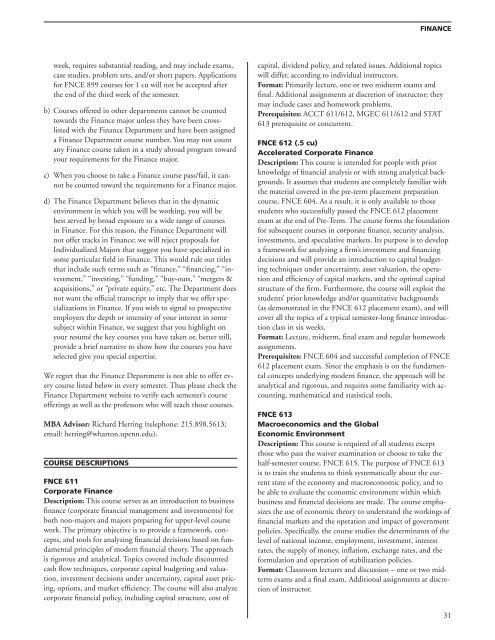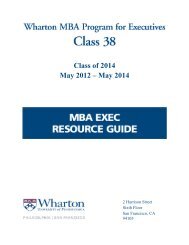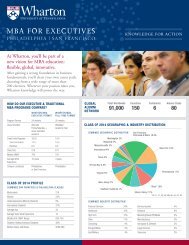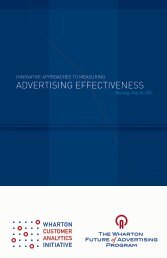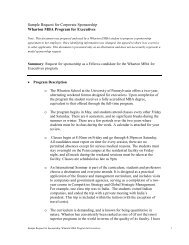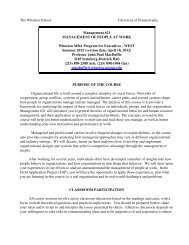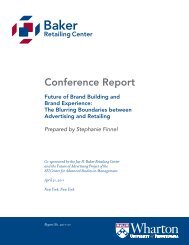Explore Options; Plan Your MBA Academic Program
Explore Options; Plan Your MBA Academic Program
Explore Options; Plan Your MBA Academic Program
You also want an ePaper? Increase the reach of your titles
YUMPU automatically turns print PDFs into web optimized ePapers that Google loves.
week, requires substantial reading, and may include exams,<br />
case studies, problem sets, and/or short papers . Applications<br />
for FNCE 899 courses for 1 cu will not be accepted after<br />
the end of the third week of the semester .<br />
b) Courses offered in other departments cannot be counted<br />
towards the Finance major unless they have been crosslisted<br />
with the Finance Department and have been assigned<br />
a Finance Department course number . You may not count<br />
any Finance course taken in a study abroad program toward<br />
your requirements for the Finance major .<br />
c) When you choose to take a Finance course pass/fail, it cannot<br />
be counted toward the requirements for a Finance major .<br />
d) The Finance Department believes that in the dynamic<br />
environment in which you will be working, you will be<br />
best served by broad exposure to a wide range of courses<br />
in Finance . For this reason, the Finance Department will<br />
not offer tracks in Finance; we will reject proposals for<br />
Individualized Majors that suggest you have specialized in<br />
some particular field in Finance . This would rule out titles<br />
that include such terms such as “finance,” “financing,” “investment,”<br />
“investing,” “funding,” “buy-outs,” “mergers &<br />
acquisitions,” or “private equity,” etc . The Department does<br />
not want the official transcript to imply that we offer specializations<br />
in Finance . If you wish to signal to prospective<br />
employers the depth or intensity of your interest in some<br />
subject within Finance, we suggest that you highlight on<br />
your resumé the key courses you have taken or, better still,<br />
provide a brief narrative to show how the courses you have<br />
selected give you special expertise .<br />
We regret that the Finance Department is not able to offer every<br />
course listed below in every semester . Thus please check the<br />
Finance Department website to verify each semester’s course<br />
offerings as well as the professors who will teach those courses .<br />
<strong>MBA</strong> Advisor: Richard Herring (telephone: 215 .898 .5613;<br />
email: herring@wharton .upenn .edu) .<br />
COURSE DESCRIPTIONS<br />
FNCE 611<br />
Corporate Finance<br />
Description: This course serves as an introduction to business<br />
finance (corporate financial management and investments) for<br />
both non-majors and majors preparing for upper-level course<br />
work . The primary objective is to provide a framework, concepts,<br />
and tools for analyzing financial decisions based on fundamental<br />
principles of modern financial theory . The approach<br />
is rigorous and analytical . Topics covered include discounted<br />
cash flow techniques, corporate capital budgeting and valuation,<br />
investment decisions under uncertainty, capital asset pricing,<br />
options, and market efficiency . The course will also analyze<br />
corporate financial policy, including capital structure, cost of<br />
FINANCE<br />
capital, dividend policy, and related issues . Additional topics<br />
will differ, according to individual instructors .<br />
Format: Primarily lecture, one or two midterm exams and<br />
final . Additional assignments at discretion of instructor; they<br />
may include cases and homework problems .<br />
Prerequisites: ACCT 611/612, MGEC 611/612 and STAT<br />
613 prerequisite or concurrent .<br />
FNCE 612 ( .5 cu)<br />
Accelerated Corporate Finance<br />
Description: This course is intended for people with prior<br />
knowledge of financial analysis or with strong analytical backgrounds<br />
. It assumes that students are completely familiar with<br />
the material covered in the pre-term placement preparation<br />
course, FNCE 604 . As a result, it is only available to those<br />
students who successfully passed the FNCE 612 placement<br />
exam at the end of Pre-Term . The course forms the foundation<br />
for subsequent courses in corporate finance, security analysis,<br />
investments, and speculative markets . Its purpose is to develop<br />
a framework for analyzing a firm’s investment and financing<br />
decisions and will provide an introduction to capital budgeting<br />
techniques under uncertainty, asset valuation, the operation<br />
and efficiency of capital markets, and the optimal capital<br />
structure of the firm . Furthermore, the course will exploit the<br />
students’ prior knowledge and/or quantitative backgrounds<br />
(as demonstrated in the FNCE 612 placement exam), and will<br />
cover all the topics of a typical semester-long finance introduction<br />
class in six weeks .<br />
Format: Lecture, midterm, final exam and regular homework<br />
assignments .<br />
Prerequisites: FNCE 604 and successful completion of FNCE<br />
612 placement exam . Since the emphasis is on the fundamental<br />
concepts underlying modern finance, the approach will be<br />
analytical and rigorous, and requires some familiarity with accounting,<br />
mathematical and statistical tools .<br />
FNCE 613<br />
Macroeconomics and the Global<br />
Economic Environment<br />
Description: This course is required of all students except<br />
those who pass the waiver examination or choose to take the<br />
half-semester course, FNCE 615 . The purpose of FNCE 613<br />
is to train the students to think systematically about the current<br />
state of the economy and macroeconomic policy, and to<br />
be able to evaluate the economic environment within which<br />
business and financial decisions are made . The course emphasizes<br />
the use of economic theory to understand the workings of<br />
financial markets and the operation and impact of government<br />
policies . Specifically, the course studies the determinants of the<br />
level of national income, employment, investment, interest<br />
rates, the supply of money, inflation, exchange rates, and the<br />
formulation and operation of stabilization policies .<br />
Format: Classroom lectures and discussion – one or two midterm<br />
exams and a final exam . Additional assignments at discretion<br />
of instructor .<br />
31


